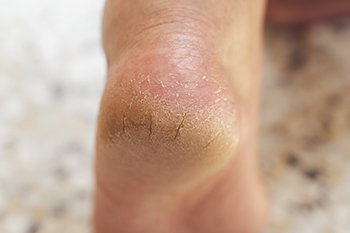
Dry, cracked heels, also known as heel fissures, are a common foot problem resulting in rough, flaky skin on the heels that can lead to painful cracks. This condition often occurs when the skin becomes excessively dry, which can be worsened by cold weather, prolonged standing, or wearing open-back shoes that allow the skin to expand and dry out. People who are more at risk include those with conditions like diabetes, obesity, or eczema, as well as individuals who frequently walk barefoot or have naturally dry skin. Symptoms include rough, thickened skin, itching, and in severe cases, deep cracks that can bleed and become infected. Mild relief can come from regularly moisturizing the feet with thick creams or ointments, using a pumice stone to gently remove dead skin, and wearing supportive shoes that protect the heels. Preventive measures include keeping the feet well-hydrated, avoiding harsh soaps, and wearing socks with closed-back shoes to maintain moisture. If your cracked heels are severe or become infected, it is strongly suggested that you seek care from a podiatrist.
Cracked heels are unsightly and can cause further damage to your shoes and feet. If you have any concerns, contact one of our podiatrists from Columbus Podiatry & Surgery. Our podiatrists can provide the care you need to keep you pain-free and on your feet.
Cracked Heels
Cracked heels appear unappealing and can make it harder for you walk around in sandals. Aside from looking unpleasant, cracked heels can also tear stockings, socks, and wear out your shoes. There are several methods to help restore a cracked heel and prevent further damage.
How Do You Get Them?
Dry skin is the number one culprit in creating cracked heels. Many athletes, walkers, joggers, and even swimmers suffer from cracked heels. Age and skin oil production play a role to getting cracked heels as well.
Promote Healing
Over the counter medicines can help, especially for those that need instant relief or who suffer from chronic dry feet.
Wear Socks – Wearing socks with medicated creams helps lock in moisture.
Moisturizers – Applying both day and night will help alleviate dryness which causes cracking.
Pumice Stones – These exfoliate and remove dead skin, which allows for smoother moisturizer application and better absorption into the skin.
Change in Diet
Eating healthy with a well-balanced diet will give the skin a fresh and radiant look. Your body responds to the kinds of food you ingest. Omega-3 fatty acids and zinc supplements can also revitalize skin tissue.
Most importantly, seek professional help if unsure how to proceed in treating cracked heels. A podiatrist will help you with any questions or information needed.
If you have any questions, please feel free to contact our office located in Columbus, OH . We offer the newest diagnostic and treatment technologies for all your foot care needs.
